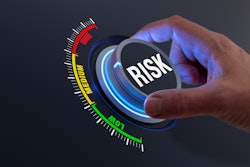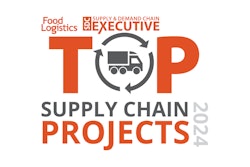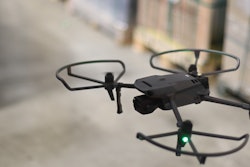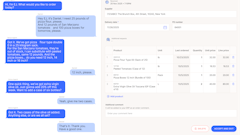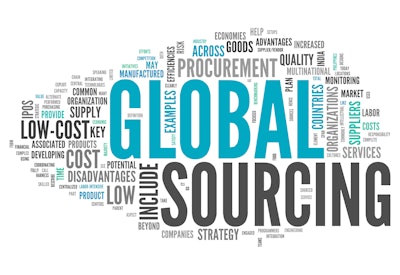
Over the years, executing a risk mitigation plan has transformed from something that’s nice to have to something that every company must have, at all times, in all facets of the organization.
From the influx of cargo theft, cybersecurity threats, food safety and driver shortage to geopolitical tensions, strikes from rail/dock workers, natural disasters and more, even the smallest gap can pose serious threat to people, product and plant.
Liken it to the blind leading the blind, getting lost in a maze or driving while blindfolded.
Not being able to see ahead and predict and plan accordingly is what sometimes plagues many of today’s supply chain companies.
That’s why mitigating supply chain threats is of utmost importance heading into 2024.
Marina Mayer, editor-in-chief of Food Logistics and Supply & Demand Chain Executive, talks exclusively with Eric Linxwiler, senior VP at TradeBeyond, about how the instability that rocked the food supply chain in 2023 underscores the urgent need for a more agile and resilient approach to supply chain management.
CLICK HERE to read the article in full.
Food Logistics: What are some of the cold food chain’s biggest threats to date? And why?
Eric Linxwiler: The cold food chain, critical for the integrity of both finished products as well as many ingredients, faces a myriad of threats, each with significant implications. The two most crucial factors in the cold chain are delays in the movement of raw materials and goods, and the break of the cold chain, where optimal low temperatures are compromised. Food safety remains a paramount concern, as any break in the cold chain can lead to spoilage or contamination of both raw materials and finished products, posing health risks and strong financial consequences. Geopolitical tensions and wars, like the conflict in Ukraine, disrupt global trade routes and create supply shortages. Looming strikes from rail and dock workers can cause severe bottlenecks, delaying shipments and leading to spoilage. Finally, natural disasters, amplified by climate change, create unpredictable crop shortages and pose unpredictable risks to transportation and storage infrastructure.
Multiple disruptions in the supply chain experienced over the last few years, such as the shortage of raw materials due to political, social, or weather disruptions, have compelled companies to test alternative suppliers with untested cold chain performance. Delays in shipment, whether of raw materials or finished goods, increase the potential of the cold chain being broken. There are multiple examples of refrigerated containers being on standby at ports with inadequate cold chain capabilities, ruining the products.
Given the delicate nature of the cold chain supply chain, having a centralized system like TradeBeyond's multi-enterprise supply chain platform, which provides real-time, complete information, is even more critical. This platform helps food and beverage retailers mitigate these disruptions by enhancing visibility and control throughout the supply chain. It enables companies to quickly adapt to and manage disruptions, ensuring minimal impact on operations. The platform's advanced traceability tools ensure that there are no lapses in a company’s sustainability standards when sourcing from alternate suppliers, and it allows for rapid decision-making to maintain the cold chain throughout.
Food Logistics: 2023 saw a lot of instability within the supply chain, such as geopolitical sanctions, natural disasters, inflation, etc. From your vantage point, how do these factors impact/influence the way companies can mitigate supply chain threats?
Linxwiler: The instability that rocked the food supply chain in 2023 underscores the urgent need for a more agile and resilient approach to supply chain management. Companies must diversify their sourcing and logistics strategies to reduce dependence on volatile regions. Investing in digital supply chain solutions, like real-time tracking and predictive analytics, is now crucial for proactive risk management. These technologies enable companies to anticipate disruptions and reconfigure their supply chains dynamically, enhancing transparency and resilience in their operations. Additionally, building stronger relationships with a diverse range of suppliers and logistics partners can provide alternative options when usual channels are disrupted.
TradeBeyond's platform, with its real-time data sharing and predictive analytics, allows companies to swiftly respond to these challenges. The platform's comprehensive approach to supply chain processes, from sourcing to shipping, enables companies to quickly adapt to changing circumstances, such as finding alternative suppliers or rerouting shipments in response to geopolitical sanctions or natural disasters.
Food Logistics: Labor disruptions are also substantially higher this year, up 136%, according to Resilinc data. This includes company and site-level strikes, national strikes, layoffs and labor protests, among others. What does this mean for the future of cold food supply chains?
Linxwiler: The significant increase in labor disruptions presents a complex challenge for the cold food supply chain. These disruptions, ranging from strikes to layoffs, heighten the risk of breaking the cold chain, which is crucial for maintaining the quality and safety of cold chain products. This trend highlights the critical need for rapid assessment and decision-making in response to unforeseen disruptions. In the context of cold chain products, where the integrity of the cold chain can be compromised very quickly, a control tower approach is more vital than ever.
TradeBeyond's multi-enterprise platform acts as this control tower, providing supply chain managers with real-time insights and analytics. This enables them to understand, assess, and respond swiftly to any disruption and its potential impact on the cold chain. With the increasing frequency of social and other disruptions, the ability to rapidly evaluate and address these challenges is crucial, especially for cold chain products. TradeBeyond's solution offers the agility and comprehensive oversight needed to maintain the cold chain's integrity amidst these challenges.
Food Logistics: What are some things not addressed above that may be pertinent to our readers?
Linxwiler: Beyond these points, it's important to consider the evolving consumer expectations around sustainability and ethical sourcing. Consumers are increasingly aware of and concerned about the environmental impact of their food choices, including the sustainability of cold chain operations. Also, regulatory changes, both in terms of food safety and environmental impact, are likely to shape the future of the cold food supply chain, requiring ongoing vigilance and adaptability from companies. For instance, the EU's new deforestation regulation requires companies to prove that commodities like coffee, palm oil, and cocoa are not linked to deforestation. To do that, food and beverage retailers must invest in robust traceability solutions.
This heightened focus on sustainability is particularly consequential for cold products. Any required changes, such as addressing deforestation, reducing carbon footprint, or complying with regulations concerning specific regions, such as China’s Uygur, necessitate a thorough validation of the new potential cold chain. This adds an additional layer of complexity that is critical for cold products. Efficient digital tools are required to conduct all necessary audits and certifications to ensure the cold chain is respected and aligns with the timeline desired for alternative options.
TradeBeyond’s traceability tools allow businesses to map their supply chains down to the Nth-tier and track and document chain of custody, ensuring compliance with global ESG laws and consumer expectations. Moreover, TradeBeyond's comprehensive approach to supply chain management helps companies maintain quality and sustainability standards even amid rapid market changes and supply chain disruptions. This unified approach ensures that companies can adapt to evolving market demands while maintaining their commitment to sustainability and ethical practices. This unified approach ensures that companies can adapt to evolving market demands and complex ESG requirements while maintaining their commitment to sustainability and ethical practices, especially in the delicate arena of cold chain management.
CLICK HERE to read the article in full.





